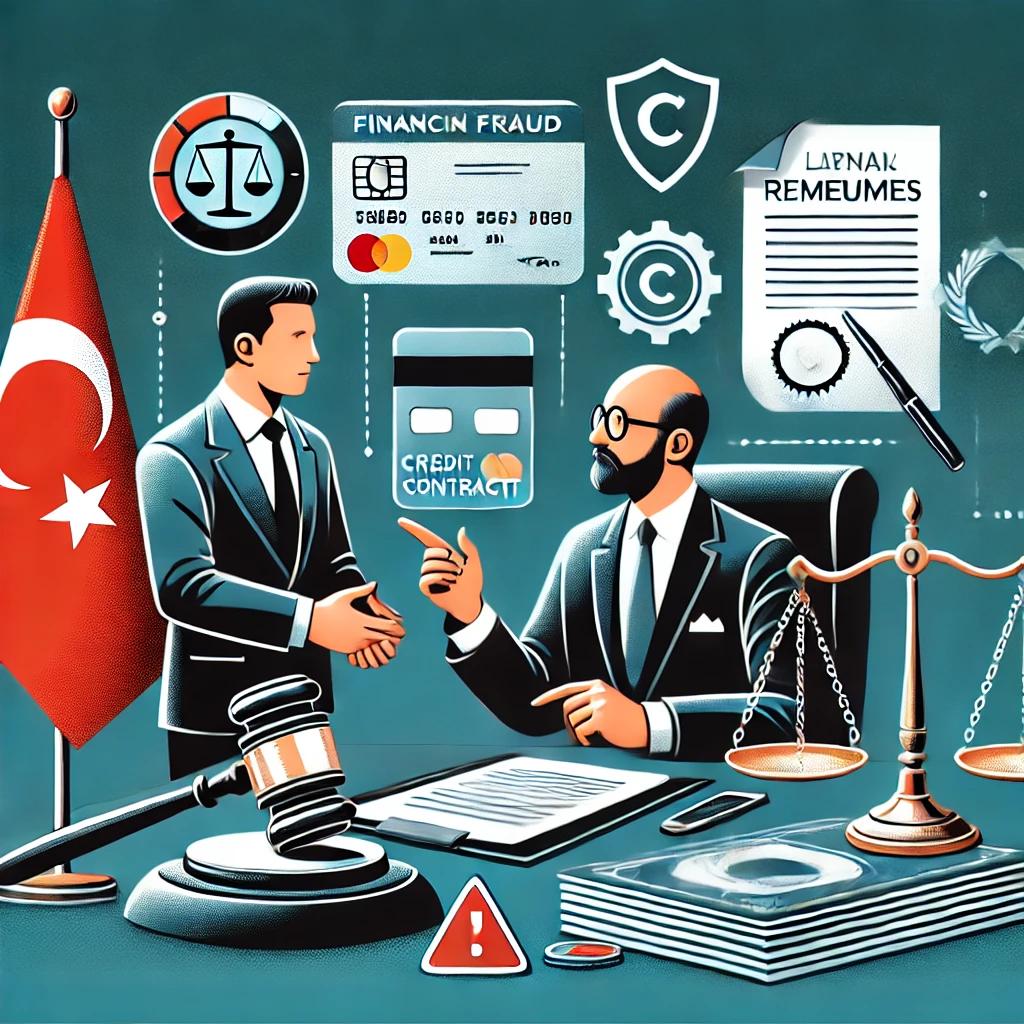Introduction
With Turkey becoming a hub for tourism, international business, and foreign investment, many foreigners participate in the financial system by opening bank accounts, making investments, or engaging in online transactions. However, financial fraud poses significant risks to these individuals. Foreigners are particularly vulnerable due to language barriers, unfamiliarity with local laws, and evolving fraud tactics. This article explores the legal framework governing financial fraud, the types of frauds foreigners often encounter, and the legal remedies available to protect their rights in Turkey.
I. Legal Framework Governing Financial Fraud in Turkey
- Turkish Penal Code (No. 5237)
- Defines fraud as obtaining financial gain through deception and imposes criminal penalties for various types of fraud, including bank fraud and phishing.
- Law on the Protection of the Consumer (No. 6502)
- Regulates consumer rights and applies to financial transactions involving services or products, such as online shopping and payment services.
- Banking Law (No. 5411)
- Governs banking operations and requires banks to protect customers from unauthorized transactions and fraud.
- Regulation on Payment and Electronic Money Institutions (No. 6493)
- Establishes rules for electronic payments and mandates secure payment methods to protect customers from online financial fraud.
- Personal Data Protection Law (KVKK, No. 6698)
- Ensures that personal financial data is securely processed and protects individuals from data breaches that could lead to fraud.
II. Types of Financial Fraud Commonly Faced by Foreigners in Turkey
- Banking and Credit Card Fraud
- Foreigners may experience unauthorized transactions or card cloning at ATMs. Fraudsters can also exploit phishing attacks to steal banking credentials.
- Investment Fraud and Ponzi Schemes
- Fraudulent investment opportunities targeting foreigners promise high returns with low risks, often leading to financial losses.
- Real Estate Scams
- Some foreigners fall victim to real estate scams, where fraudsters sell non-existent or disputed properties, leading to property loss and legal disputes.
- Online Shopping Fraud
- In online marketplaces, some sellers fail to deliver products or provide counterfeit goods, leaving the buyer without recourse if payments are made through unregulated channels.
- Cryptocurrency Scams
- With the growing popularity of cryptocurrencies, foreigners are targeted by fraudulent platforms promising quick profits or conducting fake ICOs (Initial Coin Offerings).
III. Legal Rights and Protections for Foreign Victims of Financial Fraud
- Right to Compensation for Unauthorized Transactions
- Under the Banking Law, banks are required to reimburse customers for unauthorized transactions, provided that the fraud is reported promptly.
- Right to Cancel Fraudulent Contracts
- Foreign consumers can cancel contracts and demand refunds for services or goods obtained through deceptive means under consumer protection laws.
- Right to File Criminal Complaints
- Victims can file a criminal complaint with the police or prosecutor’s office against the fraudster. Fraud is punishable under the Turkish Penal Code.
- Right to Seek Mediation or Legal Action
- Victims can initiate legal proceedings in civil courts or seek mediation to resolve financial disputes.
- Protection Under Personal Data Law (KVKK)
- If the fraud involves personal data breaches, victims can file a complaint with the Personal Data Protection Authority for compensation or corrective action.
IV. Steps to Take if Financial Fraud Occurs
- Report the Fraud to the Bank or Payment Institution
- Foreign victims should immediately notify their bank or payment service provider to block transactions and initiate an investigation.
- File a Complaint with the Police or Prosecutor’s Office
- Victims can submit a criminal complaint detailing the fraudulent activity to the relevant authorities.
- Notify the Financial Crime Investigation Board (MASAK)
- If the fraud involves money laundering or large financial losses, victims can report the case to MASAK for further investigation.
- Seek Legal Assistance for Complex Cases
- Hiring a lawyer experienced in financial fraud can help navigate the legal process and maximize the chances of recovery.
- Monitor Personal Data for Further Fraud Attempts
- Victims should monitor their accounts and personal data to prevent additional fraud attempts.
V. Dispute Resolution and Compensation Mechanisms
- Bank’s Internal Dispute Resolution Mechanism
- Many banks offer internal dispute resolution services to handle complaints related to unauthorized transactions and fraud.
- Arbitration or Mediation for Financial Disputes
- Victims can resolve disputes through mediation or arbitration, avoiding lengthy court procedures.
- Filing a Lawsuit in Civil or Criminal Court
- For significant financial losses, victims can file a civil lawsuit seeking compensation or participate in criminal proceedings against the fraudsters.
- Compensation from Payment Providers
- Foreigners using regulated payment systems have the right to demand chargebacks or refunds for fraudulent transactions.
VI. Recommendations for Foreigners to Avoid Financial Fraud
- Use Trusted Banks and Payment Platforms
- Foreigners should only engage with reputable banks and regulated financial institutions to reduce the risk of fraud.
- Avoid High-Risk Investment Opportunities
- Investments promising guaranteed returns should be carefully scrutinized to detect potential fraud schemes.
- Enable Fraud Alerts and Secure Transactions
- Setting up fraud alerts and using two-factor authentication can enhance security and prevent unauthorized transactions.
- Research Real Estate Deals Thoroughly
- Foreigners should verify property ownership through official channels before making payments in real estate transactions.
- Stay Informed about Emerging Fraud Tactics
- Keeping up with current fraud trends in Turkey helps foreigners identify and avoid evolving scams.
VII. Conclusion
While financial fraud is a growing concern for foreigners in Turkey, the legal framework offers protections through banking laws, consumer rights, and personal data regulations. By understanding their rights, reporting fraud promptly, and engaging with legal counsel, foreigners can minimize losses and resolve disputes effectively.
The increasing digitization of financial transactions requires both vigilance and proactive measures to prevent fraud. With greater awareness and collaboration between financial institutions and regulatory bodies, foreigners can navigate the financial landscape in Turkey safely.

Yanıt yok